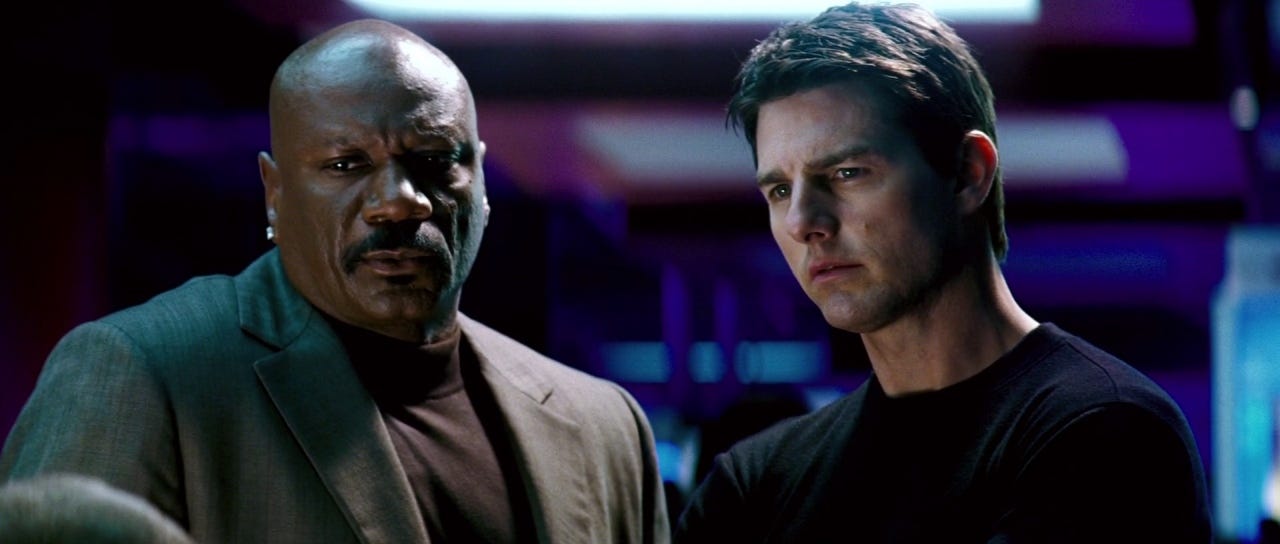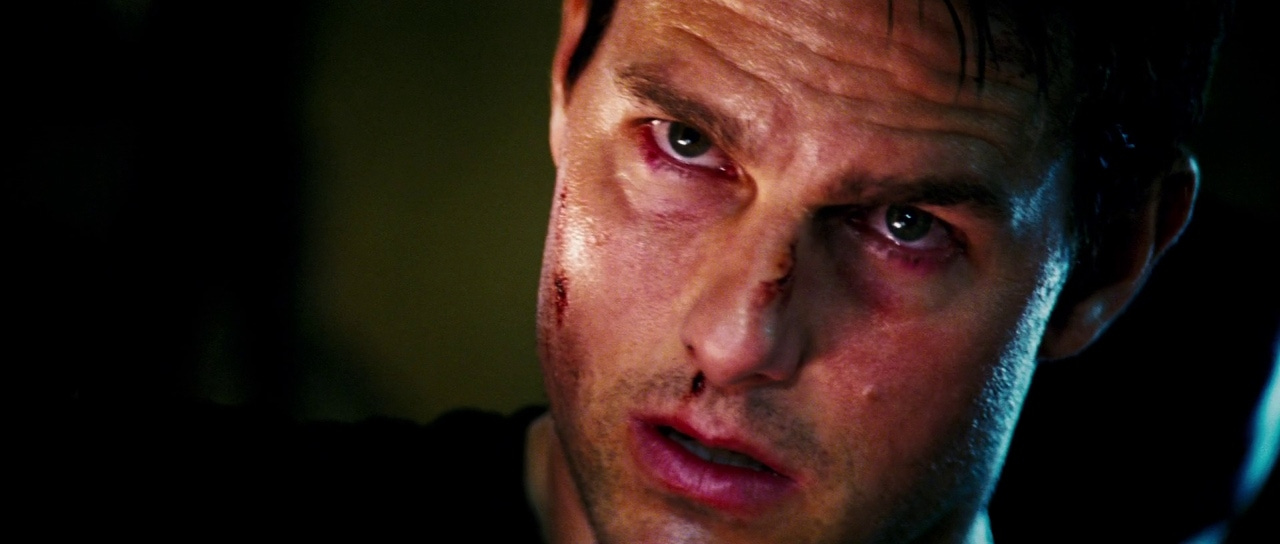Review: "MISSION: IMPOSSIBLE III" reminds us J.J. Abrams was always mid
It's Abrams' best movie, but the worst of the Mission: Impossible series
“Humpty Dumpty sat on a wall.”
If one goes by the metric that the quality of a Mission: Impossible movie is directly proportional to how much Tom Cruise furiously runs in it, then Mission: Impossible III is quite possibly the best of the best. There is some top-tier, Grade-A, premium uncut Tom-Cruise-running-like-a-maniac action in this one, particularly at the climax. And it is, as always, extremely fun to watch.
Sadly, this metric is imperfect, and I don't think Mission: Impossible III is anywhere near the series’ best. In fact, revisiting it now, I feel pretty confident in declaring the film my least favorite in the series.
That’s a big change from how I initially felt, 19 years ago, when I liked the film so much I kept going back to see it in theaters throughout the summer. And it’s an opinion at odds with the film’s reputation today, where it is popularly remembered as a turning point in the series, the film that brought Mission: Impossible back to life and got it up and running as an ongoing concern with actual character and cast continuity. There is some truth to that, certainly: a lot of Ethan Hunt’s characterization and Cruise’s performance snap into focus here in a way that lays a foundation for everything to come (I absolutely adore how he plays the scene at the end of coaching Julia through shocking him nearly to death, which feels like Cruise consciously tapping into the fact that Hunt is a little bit crazy for the first time); the film lands on a tone that proves sustainable for future entries; Simon Pegg gets brought into the fold; and while every entry in the series has great music, Michael Giacchino’s score here definitely levels up and, again, lays a foundation both he and future composers will build on.
But in other ways, I think it’s underappreciated just how creaky and generic this feels in comparison to every other Mission: Impossible film. It’s certainly a cut above many 21st-century Hollywood actioners (Cruise’s strengths as a producer give this series a floor of energy and competence far above what most studio franchise pictures are capable of). But the simple fact of the matter is that J.J. Abrams is far and away the most insubstantial director to ever work on this series, and while this is easily the best film he’s ever made, it’s also the Mission: Impossible movie with the biggest deficiencies in action and visual style, the one that feels least exceptional as a piece of cinematic construction.
The film is generally good looking, at least when Abrams isn’t flashing blinding lights in our eyes in time with rapid cuts and disorienting handheld footage, or pushing the camera in way too close on faces in a way that looks awkward and uncomfortable in scope widescreen, or guiding his camera up and down women’s bodies in the most grossly leering of ways, or…well, I’m clearly getting off track. I like the film’s vibrant use of color, I guess, at least when it’s not too garishly saturated. And the stunts are well-captured, in full view with nice clear framing, probably because Cruise would (rightly) have the heads of anyone who messed up those shots.
But the film clearly lacks an inspired visual signature like Brian De Palma’s, or the delirious operatic sensibilities of John Woo, or Christopher McQuarrie’s virtuosic visual storytelling and magician’s confidence in staging crazy stunts. Everything Abrams does well here is something Brad Bird would substantially improve upon in the next film, and everything Brad Bird does well is something McQuarrie would substantially improve upon after that. And Abrams just does some things downright poorly: the shootout to save Keri Russell is far and away the worst action scene in the franchise, maybe the only one I’d call outright ‘bad,’ because of how hyperactive and visually unclear Abrams’ filmmaking is there (though the helicopter chase that follows is substantially better). Mission: Impossible III simply cannot bring something singular to the table in style or staging the way all the other films do, and for a series I associate most strongly with formal cinematic excellence, that inherently makes this one the least interesting to me, even if it gets some things right that future films are able to build upon.
Maybe that wouldn’t matter so much if the film was simply exceptional at the level of story, but there, you’ve got a script by Alex Kurtzman and Roberto Orci to contend with. While this is, as with Abrams’ direction, absolutely the most competent piece of writing these world-class hacks have ever put their name to, it still has many of their weird signature problems, like sidelining the great Philip Seymour Hoffman just as we steer into the third act so they can do a twist with Billy Crudup and get their conspiracy theory rocks off (they do something like this in every movie they’ve ever written, and Orci is an avowed 9/11 truther). Hoffman is truly great here, so casual and nonchalant in his psychopathic evil, but I think he’s giving a lot more than he’s getting. The film has two big scenes for him to sink his teeth into (the in medias res opening, and the confrontation on the plane), and outside of that, the script just doesn’t have a whole lot to say or do with him; his final confrontation with Hunt feels like a shrug of an afterthought. And while the ‘rabbit’s foot’ doesn’t annoy me as much as later Kurtzman/Orci/Abrams ‘mystery boxes,’ it’s hard not to watch the film today, with later works like Star Trek Into Darkness or Star Wars: The Rise of Skywalker rattling around in one’s head, and not feel at least a little annoyed at the self-satisfied way the film weasels out of having to write an actual threat.
To be fair, the film does have one truly great scene, and it is that in medias res opening. As with Abrams’ next movie, the Star Trek reboot, the best scene of Mission: Impossible III is the first one, an incredibly tense standoff between Cruise and Hoffman, where Hoffman plays things with total control while Cruise goes through every flavor of grief, rage, and bargaining he can in the span of just a few minutes. It’s stupendous, a great piece of showmanship that forces one to sit up and pay attention. But on a formal, narrative, and performance level, I don’t think the film ever works its way back to that high point again; in fact, the moment when the film returns to this scene chronologically is the point where the balloon fully deflates for me, with the Billy Crudup ‘twist’ sucking a lot of the remaining oxygen and momentum out of the picture. The opening winds up being a magic trick where the set-up is a lot more exciting than the follow through – and that feels wrong in a series that so often works magic to its fullest extent.
Mission: Impossible III also has the wrong ending. This should be a story about how Ethan can’t stay away from the game, because he is unable suppress his conscience enough to honestly pursue a life with Julia in the suburbs. The story needs to arrive at a point where Ethan recognizes he can truly love Julia with all his heart and still not be able to commit to that relationship because he believes he has a higher calling. That’s the explanation McQuarrie eventually gives us in Fallout, and it feels totally right to who Ethan Hunt is. Hunt is basically Superman, and just as Superman can never just give up the cape and settle down with Lois Lane, it doesn’t feel right for Ethan to end the movie walking into the sunset happy and domesticated with Michael Giacchino playing romantic string music in the background. Even if the series didn’t have the issue of having to eventually make sequels – even if this was the very last time we ever saw Ethan Hunt – it just wouldn’t feel right to me as an ending. And it’s all symbolic of how the film ultimately doesn’t have much of a story to tell with Ethan beyond ‘he wants to save his wife,’ whereas every other entry ultimately has more interesting things to say and do with his character (even Mission: Impossible II builds its entire climax around Ethan’s refusal to make a sacrifice and take the easy way out of a mission).
If I sound mostly negative here, that’s because I’m justifying the idea that this is my least favorite Mission: Impossible. It is not a bad movie, and the things that are genuinely good about it – Hoffman’s performance, the chemistry of the main ensemble, and a really winning turn by Michelle Monaghan, who was so close to being a Really Big Thing in the mid-to-late aughts and now isn’t because our world is terrible – are, I think, perfectly well-understood. It is a fun way to spend two hours. But personally, I’ll take a much messier movie with a much bigger, more singular personality – like Mission: Impossible II – over this more anonymous flavor any day of the week.
TOMORROW: Tom Cruise climbs the world’s tallest building, and we revisit Brad Bird’s MISSION: IMPOSSIBLE - GHOST PROTOCOL.
Read the book 200 Reviews by Jonathan R. Lack in Paperback or on Kindle
Subscribe to PURELY ACADEMIC, our monthly variety podcast about movies, video games, TV, and more
Like anime? Listen to the podcast I host with Sean Chapman, JAPANIMATION STATION, where we review all sorts of anime every week. Watch on YouTube or Subscribe wherever you get your podcasts.






